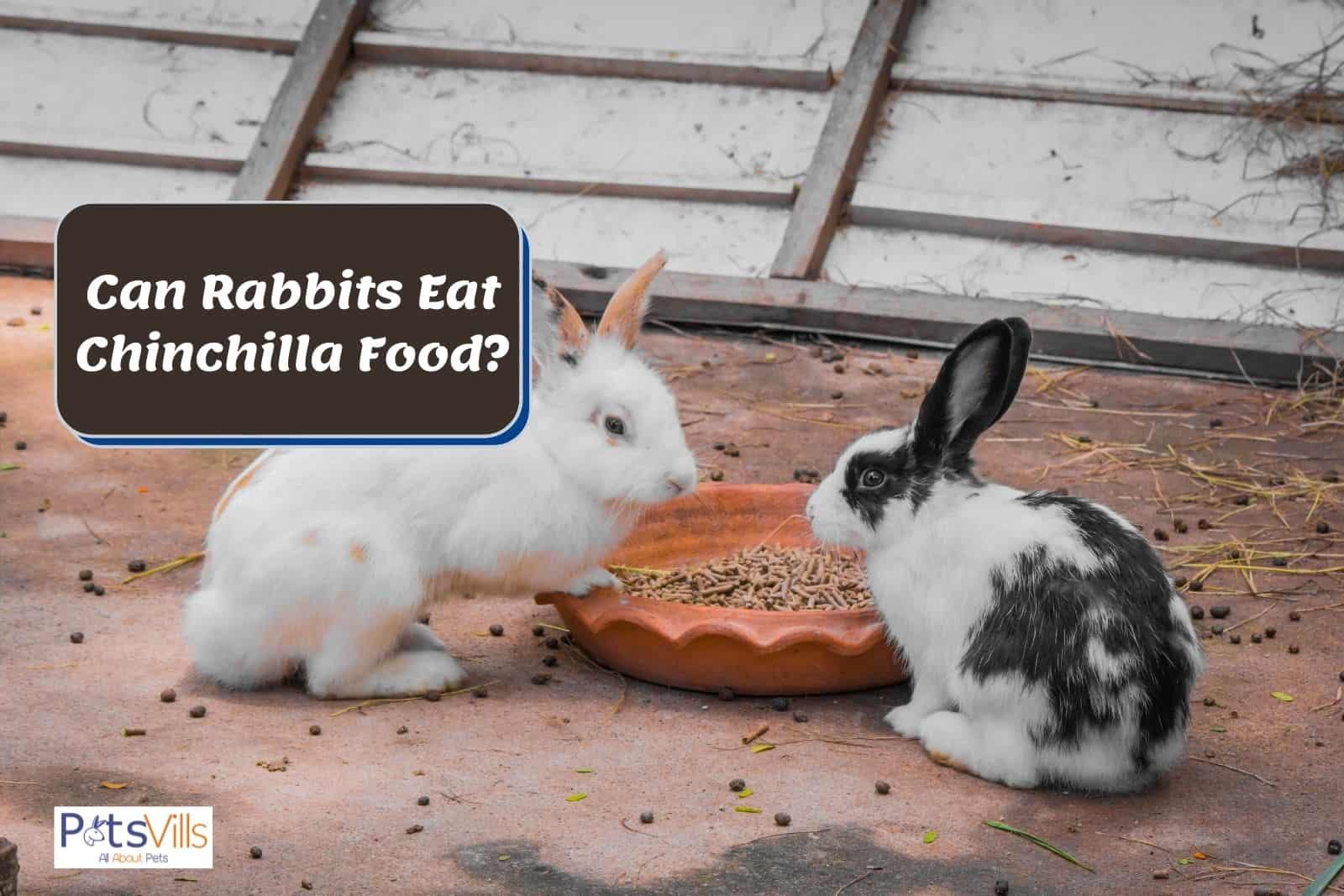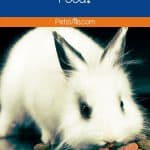Rabbits too have a very delicate digestive system. Therefore, it is important to feed them with the correct high-quality food.
Can rabbits eat chinchilla food? Rabbits cannot eat chinchilla food since their food requires high protein content that chinchilla food does not have.
Rabbits should be fed a strict diet of fresh hay, small amounts of quality pellets, fresh vegetables with a constant supply of water. You can feed your rabbit treats in limited quantities.
Table of Contents
Can Rabbits Eat Chinchilla Food?
Rabbits have different dietary requirements than chinchillas, and should not be fed the same diet.
Chinchilla grass-based pellets will have different nutrient values than what rabbits need.
Rabbits require a larger amount of protein than chinchillas and therefore need specialized food.
What Food Should Rabbits Eat?
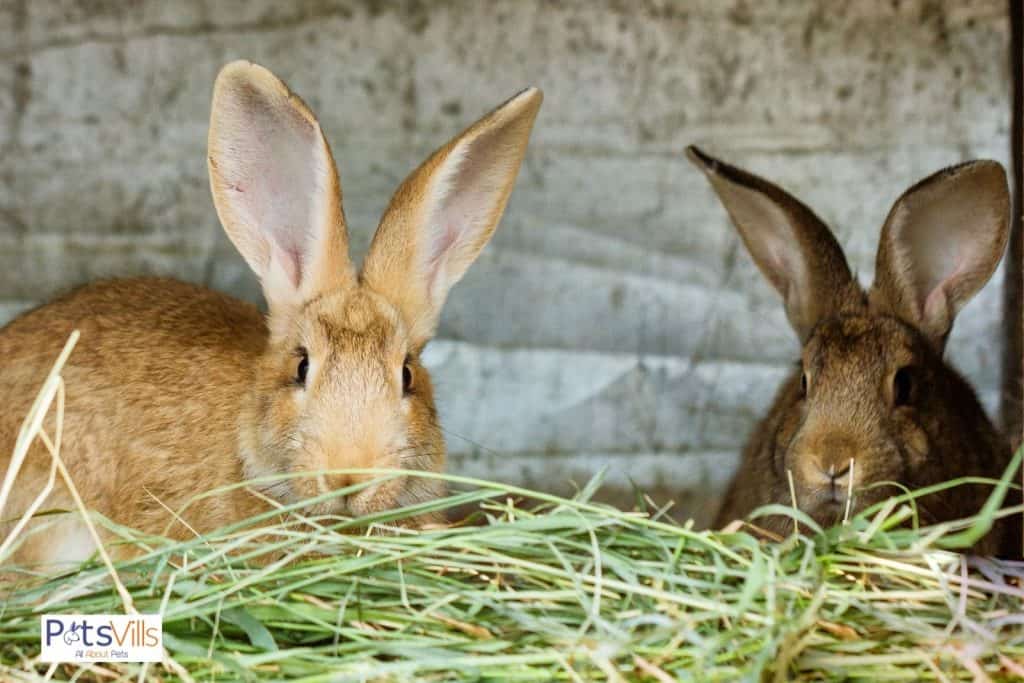
Fresh hay should make up 75% of rabbits’ diets and needs to be available to them at all times.
Adult rabbits feed on oat hays, grass, and timothy hay.
Young rabbits should eat alfalfa hay. Alfalfa is rich in sugar and protein, so it is not good for adult chinchillas.
Hay is crucial in a rabbit’s diet because it provides the right amount of fiber required for smooth digestion to help wear down rabbit’s teeth.
Rabbits’ teeth grow continuously.
Putting some hay at one corner of a litter box will encourage the rabbit to use the litter box because rabbits like to eat and poop.
When buying hay, ensure it smells and looks fresh.
Do not purchase hay that smells awful or looks moldy or brown.
Always make sure that the hay is dry.
Are Vegetables and Fruits Good For Rabbits?
There are different types of vegetables that rabbits can eat.
When looking for vegetables, make sure they are fresh and pest-free.
Wash the veggies before you provide them to your chinchillas.
The vegetable must be consumed in small amounts until you know how your rabbits respond positively to them.
Rabbits don’t respond well to houseplant leaves as they can be poisonous to them.
So, what vegetables can rabbits eat?
Other great vegetable options for your rabbits include:
- Mint
- Mustard greens
- Parsley
- Collard greens
- Dandelion leaves
- Dill
- Kale
- Watercress
- Basil
- Bok choy
- Celery
- Cilantro
- Clover
- Broccoli leaves
- Carrot tops
What Other Types of Foods Can Rabbits Eat?
Pellets
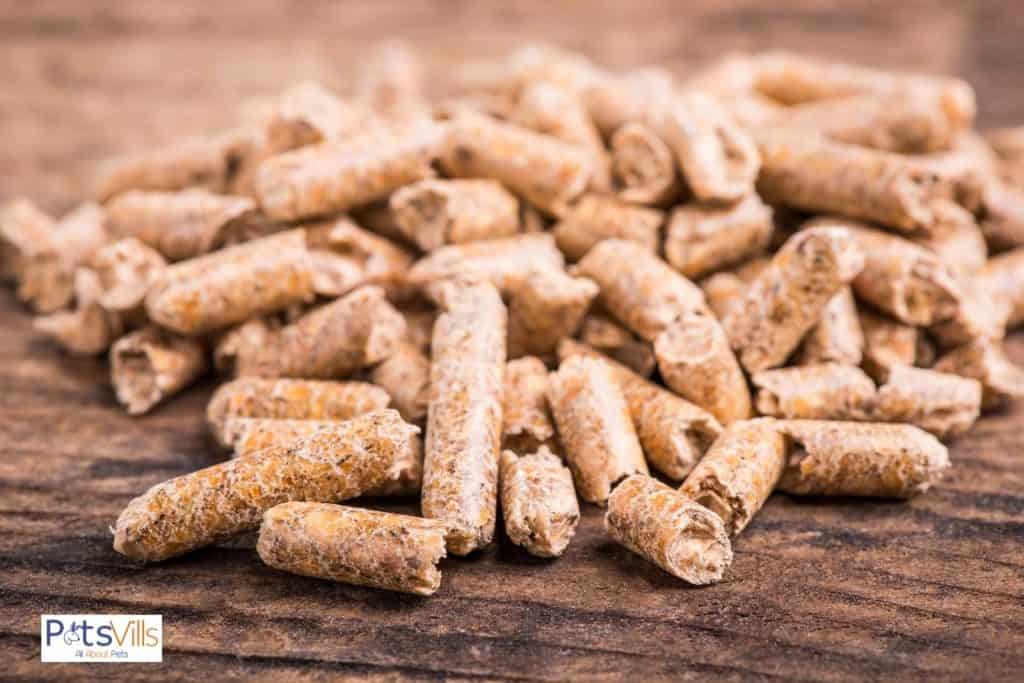
Make sure the pellets you’re feeding your rabbit are fresh and not stale.
Purchase pellets that are rich in fiber and low in protein.
You must control your pet’s pellet intake as they age. A lot of protein can cause obesity and other health problems in rabbits. Avoid mixed pellets because they can cause digestive issues.
Grass Hay
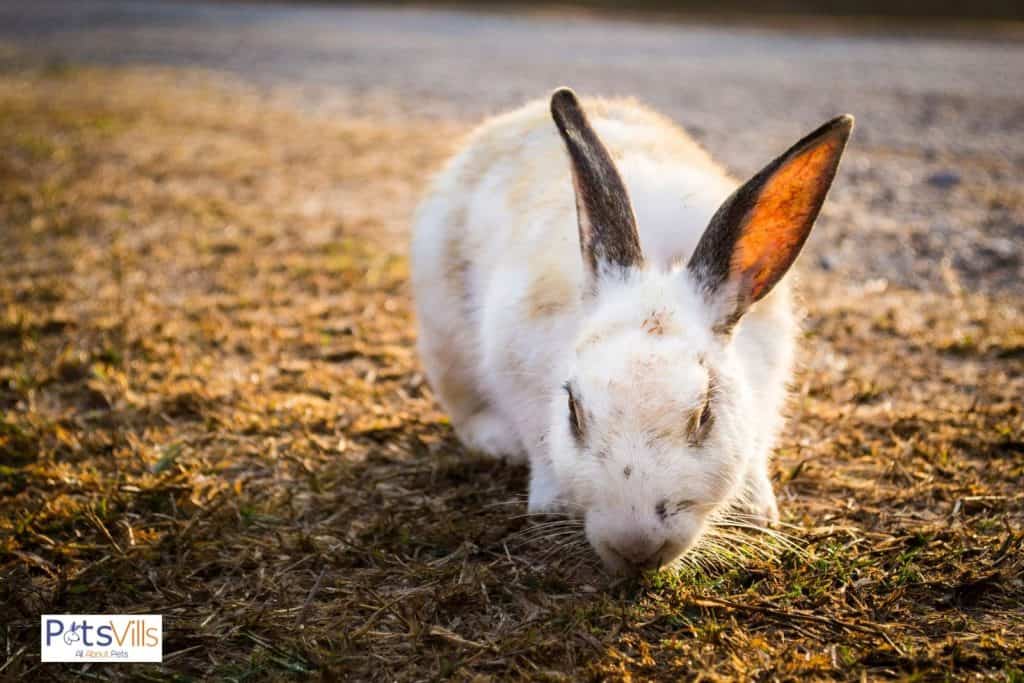
Rabbits love orchard and timothy grass hay. Hay is preferable to pellets because hay helps in digestion and also helps to remove hair that collects in the stomach.
However, alfalfa is not that good as the main food because it is rich in calcium. Your excess amounts of calcium can cause kidney issues in your rabbits. However, an occasional treat is okay. Also, you may want to avoid spinach at all costs as it is also rich in calcium.
A List of Great Treats for Rabbits
It is good to provide treats to your rabbits every now and then, but you must make sure you’re not giving them too many as it can be unhealthy.
Do not feed your rabbit foods with too many carbohydrates as they are very high in sugars and fats.
The best treatment for your rabbits is fruits, but you should give them sparingly, due to the high sugar content.
Try to get them organic fruits that are pesticide-free.
Fruits that rabbits enjoy include:
- Pineapple
- Apples
- Raspberries
- Strawberries
- Bananas
What Foods Are Dangerous To Rabbits?
Yogurt Drops
Yogurt drops are very dangerous for your rabbit and is a serious health risk. It can cause Enterotoxemia.
Bread, Pasta, Cookies, and Crackers
These types of foods can cause serious stomach problems for your rabbits. Avoid giving your chinchillas food with artificial ingredients and too much sugar.
Avocado
Many pet owners think the best snacks for rabbits include all veggies and fresh fruits.
However, rabbits should not take avocados because it contains high amounts of fat, which could be deadly to your rabbits.
Cereal
Cereals such as muesli, which is made from flaked maize, grains, pellets, seeds, and peas can cause stomach and tooth issues.
Iceberg Lettuce
Do not feed your rabbit iceberg lettuce. This may come as a shock but lettuce is rich in lactucarium, a very dangerous chemical that can upset your rabbit’s stomach if ingested.
Silverbeet
Silverbeet, just like iceberg lettuce is another vegetable your rabbits must avoid.
According to studies, Silverbeet can make your rabbit’s stomach bloat and lead to colic.
Instead, you should replace it with good foods such as alfalfa, radishes, rosemary, veggies, fruits, and herbs.
Chocolate
Chocolate should be avoided at all costs and it’s very unhealthy for rabbits to consume.
How Much Food Should a Rabbit Consume?
Rabbits need about two tablespoons of rabbit pellets and a constant supply of hay.
Rabbits don’t overeat but you should serve them pellets in small quantities.
It’s best to feed your rabbit in the day and evening. You can make up your routine to suit your lifestyle, but make sure to remain consistent with the custom you choose as rabbits are habitual. Y
It is advisable to use a heavy ceramic dish or a food hopper to cover the food to avoid soiling or dumping in the cage.
What Human Foods Can Rabbits Eat
Here is a list of some of the human foods that rabbits can eat:
- Pear
- Pineapple
- Plum (It should not have pits)
- Raspberries
- Rosehip
- Starfruit
- Strawberries fruits and leaves
- Tomato
- Tangerine
- Watermelon
- Kiwi Fruit
- Mango
- Nectarine
- Apricots (It should not have pits)
- Banana
- Blackberry
- Blueberries
- Carambola
- Cherry (It should not have pits)
- Cranberry
- Currant
- Cucumber. Read our complete guide on “Can Rabbits Eat Cucumber?”
- Orange (segments only)
- Melon (all melons)
- Apple (It should not contain any seeds unless all seeds removed)
- Grapes (vine, leaf, and fruit, leaf are edible)
- Huckleberry
- Papaya (It should not contain seeds)
- Peach (It should not have pits)
What Are Safe Vegetables For Rabbits?
- Grass- this one should be plucked from a plant that does not contain any fertilizer or chemicals. You should dry it before it is consumed.
- Orange, red, yellow and green Bell Peppers
- Bok Choy/Pak Choy
- Okra Leaves
- Pak Choy/Bok Choy
- Pumpkin
- Radicchio
- Radish tops
- Raspberry Leaves
- Red Rhubarb only, the rest of the plant could be poisonous
- Squash: Zucchini, Butternut, Yellow, and Pumpkin,
- Swiss Chard
- Turnip Greens
- Watercress
- Wheat Grass
- Zucchini
- Carrot Greens. Including tops)
- Carrot (it should be consumed sparingly because it contains high sugar content)
- Celeriac
- Celery (it should be chopped into tiny pieces to limit choking on strings)
- Cucumber
- Chard
- Chicory Greens
- White Clover
- Escarole
- Kale
- Lettuce (Boston, Dark Green Leaf, Romaine Bibb, and Butter)
- Mustard Spinach
- Collard Greens (this one should be consumed sparingly)
- Dandelion Greens
- Eggplant (purple fruit only; leaves toxic)
- Endive
- Alfalfa Sprouts
- Artichoke Leaves
- Arugula
- Asparagus
- Baby Sweet Corns
- Beet Greens
- Beetroot
- Chinese Cabbage
The following are safe but should only be consumed occasionally:
- Kale
- Mustard Greens
- Spinach
- Broccoli
- Cabbage
- Cauliflower
- Brussels Sprouts
The following foods are completely safe for your rabbits
- Agrimony
- Burnet
- Chamomile
- Caraway
- Carrot
- Celery (Check our complete guide on Can Rabbits Eat Celery?)
- Basil
- Beetroot
- Blackberry
- Borage
- Alfalfa
- Apple
- Avens
- Balm
- Banana
- Barley
- Broccoli
- Buckwheat
How Do You Feed Rabbits Vitamins?
If your rabbits are healthy and you are feeding them a balanced diet, then it is unlikely they will need vitamin supplements.
There are many occasions your rabbits will require additional help to get all the vitamins they need.
If you notice your rabbit’s health changing it could be because of a vitamin deficiency.
Lack of vitamin D causes the teeth and bones to soften, a condition called rickets in baby rabbits and osteocalcin in adult rabbits.
Lack of vitamin E causes muscular dystrophy in rabbits.
For female rabbits, lack of vitamin E may cause death to newly born rabbits and even unborn fetuses. Lack of vitamin A causes reproductive complications in rabbits.
Stress and illness can also compromise the health of your rabbits.
You should only provide your rabbit’s supplements under your vet’s guidance.
If rabbits do not react well to vitamins, you should take them back to the bets
You might be tempted to give your vitamin supplements by yourself. The problem is that you may over supplement their diet, which could make them sick.
When visiting your vet, you may want to bring in rabbit food or even labels from the food.
This will let the vet know what you are feeding your rabbits and if you are providing them with sufficient vitamins.
The vet will conduct a physical examination on the rabbits and do some blood tests to figure out what kind of vitamins your rabbits are deficient.
Vitamin D Deficiency
Let your rabbits spend some time in the sun to get some vitamin D, especially if they are vitamin D deficient. Light from the sun is rich in vitamin D, which is extremely important to your rabbits.
The problem with indoors is that light does not penetrate well through the windows.
To reduce vitamin D deficiency in your rabbits, you should let the rabbits get at least 1 hour of outdoor time per day.
If you do not have enough time to take your rabbits outdoors, you can still buy a UVB light system from the store as an alternative but it isn’t recommended.
FAQs
Can rabbits eat chinchilla food?
You shouldn’t feed your rabbit chinchilla food as it doesn’t have enough protein.
Can my rabbit eat fresh food?
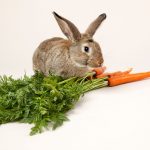
Some of the best vegetable options for your rabbit include carrots, parsley, dandelion greens, kale, lettuce, turnip greens, and collard greens.
Can you keep chinchillas and rabbits together?
A chinchilla and rabbit may get along but for their own safety, it is best to keep them separated. Rabbits can go outside whereas chinchillas cannot.
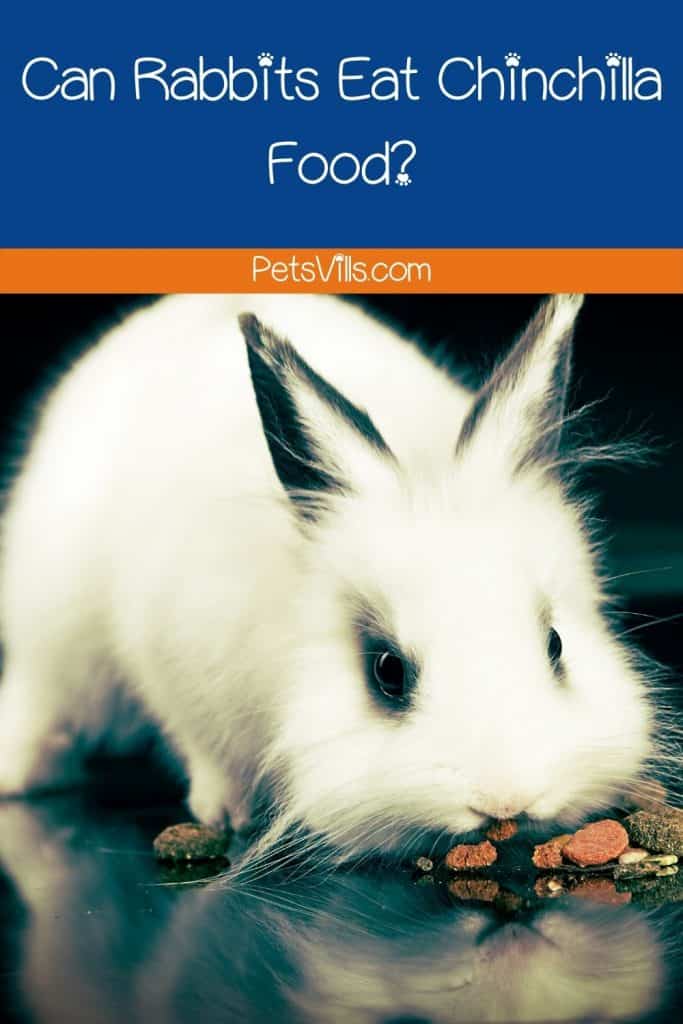
Did you ever feed chinchilla food to your rabbit? Please let us know in the comments below!
Alina Hartley is a small-town girl with a ginormous love of bearded dragons. It all started with Winchester, a baby bearded who was abandoned at the shelter by his former owners because of a birth defect that caused one front leg to be shorter than the other. Alina originally went to the shelter looking for a guinea pig, but one look at Winchester and it was love at first sight. From that day on, Alina has dedicated her life to learning everything she can about bearded dragons. She loves helping new beardie parents start their incredible journey with these magnificent reptiles.
Follow her on:
LINKEDIN
TWITTER.
Read her latest articles HERE
Learn more about her HERE.

